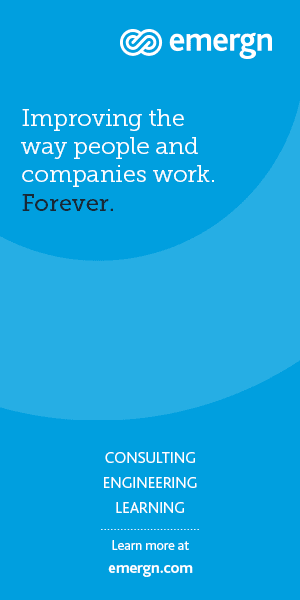OWS19 Transforms and Inspires Global Attendees
By: Sandy Frinton, Editor-in-Chief IAOP’s PULSE magazine
OWS19 sparked transformation, collaboration and inspiration for the hundreds of industry leaders from around the globe who convened for IAOP’s annual Summit, Feb. 17-20, in Orlando, Florida.
IAOP CEO Debi Hamill kicked off the preeminent event stressing the association’s key role of bringing together customers, providers and advisors who use all types of shared services models to help ignite collaborative relationships that transform businesses. “As the world around us and the business practice of outsourcing changes, our association continues to evolve,” she said.
During the three-day event, attendees learned from engaging thought leaders, tackled pressing issues together, established and renewed relationships, and left armed with new tools and know-how to tackle the challenges that lie ahead.
The role of digital technologies was a key theme throughout OWS19 and the powerful program provided the insights for the professionals to “put together the pieces of their own digital transformation puzzle,” Hamill said.
Transform
If anyone in the main opening session for Andy Walter’s keynote address thought they were immune to business disruption, the strategic advisor debunked that notion with examples from his former company, P&G, as well as Best Buy and Walmart.
“No company is too big or too small to be disrupted,” said Walter, founder of AJW-Advisory, a Certified Outsourcing Professional and a member of the IAOP Leadership Hall of Fame. “Companies that win are getting back to the basics.”
To illustrate this, Walter shared the story of how Walmart came up with a winning strategy after its model was disrupted by Amazon of leveraging digital technology to be a better version of itself versus copying their competitor’s model.
“We had a lot of players who were playing not to lose — instead of to win,” Walter said. “They are unwilling to find the next model. You can’t follow your current competition. You really need to understand your business model and where you need to take it. Change will not happen organically.”
To quickly grow its e-commerce model and get top talent, Walmart helped develop a start-up company for the primary purpose of acquiring it and has been aggressively buying up digital companies over the past several years.
Walter also shared how Dollar Shave Club disrupted P&G’s razor business by “reducing friction” with its direct-to-consumer subscription-based model that the consumer giant conceived of but failed to launch because it was then unwilling to transform.
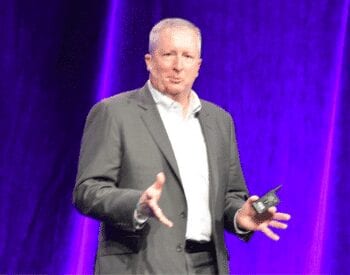
Walter spoke about the need to embrace analytics and data to truly create new business models and leverage Artificial Intelligence (AI). He also said that strong leadership and having both tactical and strategic partners are more important than ever.
The cloud also is creating new opportunities for companies of all sizes.
“Customers are willing to work with disruptive innovators like never before,” he said. “They are no longer bound by giant monolithic systems because of the cloud and are open to partnerships. If you are a big player and won’t bring disruptive innovators to me, I will replace you with disruptive innovators.”
While Walmart, P&G and Best Buy have successfully transformed, other companies who have stuck with their old business models, will slowly die. “Don’t be the frog in boiling water,” he warned.
In the next session on digital transformation journeys and outcomes, the digital revolution was quite evident when “Pepper,” an HCL humanoid robot, introduced the next speakers and appeared to listen intently and make eye contact during the presentation.
Before making it to the big stage at the Summit, Pepper was seen enjoying the pool area at the Marriott Orlando World Center, talking with guests and spotted wearing an IAOP baseball cap and also Mickey Mouse ears!
Ananth Subramanya, VP, Head of Digital and Analytics for HCL Americas, said digital has become the mainstream agenda in the C-Suite but lack of talent is creating a divide between digital strategy and execution that needs to be bridged.
According to a recent survey, 70 percent of companies have a formal digital strategy, but 44 percent feel that a lack of internal skills is their biggest barrier to achieving digital transformation. The study also found 24 percent of organizations are outsourcing implementation of digital strategies to partners in the ecosystem.
Ian Fox, head of media operations for Manchester United, shared how launching a robust cloud-based fan engagement platform with digital partner HCL was not just a technology change for the UK-based professional football (soccer) club and its 650-plus million fans but produced significant business transformation.
Launched in August, the free global app has exceeded all expectations for growth and engagement. It was the #1 app in the UK app store and ranked first in the sports category in 70 markets with downloads in more than 200 markets.
On the second day of OWS19, keynotes addressed the critical issues of cybersecurity and governance.
A panel of experts from the state of Georgia and its Technology Authority and Cyber Center, along with outsourcing partners Capgemini and NTT Data, discussed the real and inevitable cyber risks and how to combat them.
The panelists shared that the risk of experiencing a data breach (1 out of 4) is more common than getting struck by lightning (1 in 960,l000) or dating a millionaire (1 in 220). Meanwhile, the costs of data breaches have doubled in the last five years and the frequency of cyber threats are projected to rise significantly over the next three years.
Georgia started outsourcing its IT infrastructure in 2008 – not primarily as a cost-saving measure – but instead as an executive order from the state’s governor to protect its at-risk data. Outsourcing partners were able to provide the flexibility and depth of service of around-the-clock information security to its 100,000 users that the public sector could not.
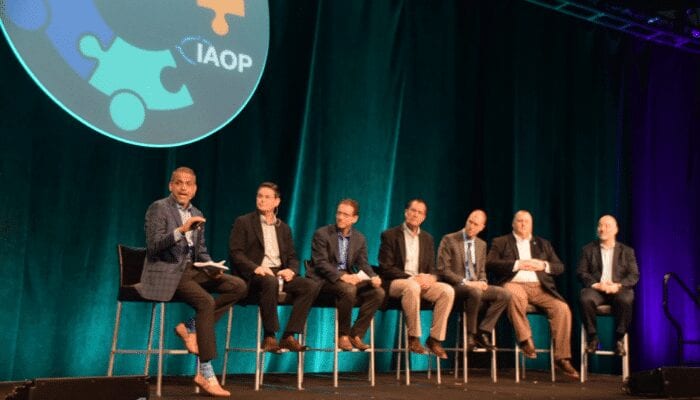
Eric Toler, executive director of the Georgia Cyber Center, a retired intelligence officer from the U.S. Army, shared updates on the $100 million state-of-the-art facility that is dedicated to training the next generation of professionals through education and real-world practice while also supporting innovative companies focused on developing new technologies to strengthen online defenses.
“It’s really about national security,” Toler said. “Together, we can win as a nation.”
As a minimum guideline to getting started on cyber protection, Nat Bongiovanni, CTO of NTT Data Federal Services, recommended companies comply with the National Institute of Standards and Technology (NIST) 800-171 standard aimed at “Protecting Controlled Unclassified Information in Nonfederal Information Systems and Organizations.” These standards apply not only to prime contractors but also to subcontractors who are frequently at risk of cyber attacks, he said.
Turning to how to keep pace with regulations in other areas, a panel of experts moderated by John Bree, SVP and Partner of NeoGroup, addressed the Evolving Governance Landscape to end the second day of OWS19.
Punit Bhatia, COP, Author of “Be Ready for GDPR,” talked about how the new European regulations put citizens in control of the use of their personal data. While some may see the rules as restrictive for companies, Bhatia said that the General Data Protection Regulation will help foster innovation more directly.
Day #3 of the Summit featured a motivating keynote presentation on How WeWork is Transforming the World of Corporate Real Estate by Craig Robinson, Global Head of Enterprise Services, Powered by We Services.
Robinson started the presentation with statistics he admitted were “depressing,” indicating that people are largely dissatisfied, unengaged and unfulfilled at work. The likelihood of being fulfilled in life if not fulfilled at work is only 1 percent, he said.
“The future of a successful workforce is fulfillment,” said Robinson, who described his company’s model that is creating efficiency, effectiveness and user experience for individuals using their office space around the world.
WeWork’s mission is to “deliver an incredible, fulfilling experience for employees of all companies — from early-stage startups to Fortune 500 companies — every day, everywhere.”
Robinson showed examples of WeWork’s reimagined office spaces around the world that use color, design, comfortable seating, reconfigured spaces, the company’s own branding and amenities that reflect the local cultures to create work environments with energy where employees can be their true authentic selves. It is now expanding its model of creating a transformative human experience to retail, school and home environments.
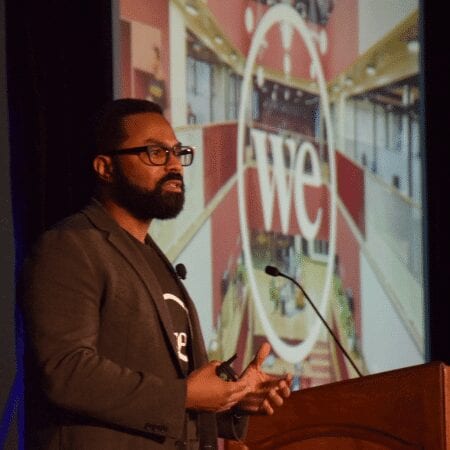
“How can we create a work environment where people feel fulfilled?” he asked the audience. “If we can do this, we’re going to do something much bigger than outsourcing. We’re going to change the world.”
To wrap up the educational part of the Summit, attendees heard from a panel of IAOP Leadership Hall of Fame members and COPs – Jag Dalal, Chief Advisor Thought Leadership, IAOP; Dave Brown, Global Lead, KPMG’s Shared Services and Outsourcing Advisory Practice; and Gregg Kirchhoefer, partner of Kirkland & Ellis.
As moderator of the panel, Dalal illustrated the evolution of outsourcing from tactical to transactional to today being transformative. While we speak about Business Process Outsourcing (BPO), in reality, companies have really been doing Functional Process Outsourcing (FPO) of siloed functions such as real estate, sales, procurement and logistics.
Next generation models will move to integrated transformation programs organized around customer and internal journeys. Dalal challenged the audience to think beyond now and into the future.
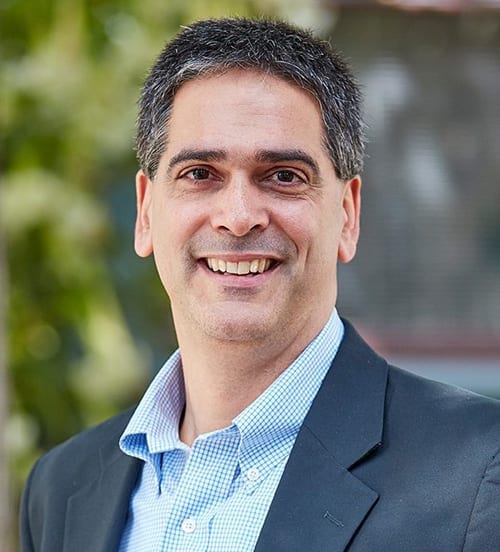
The association also inducted two new members into its Leadership Hall of Fame: KPMG’s Brown and Manjit Singh, Group Vice President and Chief Information Officer, Toyota Motor North America, Inc.
In accepting the award, Singh talked about the great change he has seen over his past 20 years from outsourcing being a cost-savings measure to becoming a “strategic lever that most companies can use to respond to changing marketplace dynamics and also to better focus attention on what they do best.”
Brown put to rest rumors that he “outsourced his Mom.” While his mother’s job at Bell Canada was indeed outsourced to a third party, he quipped that he didn’t outsource her motherly functions.
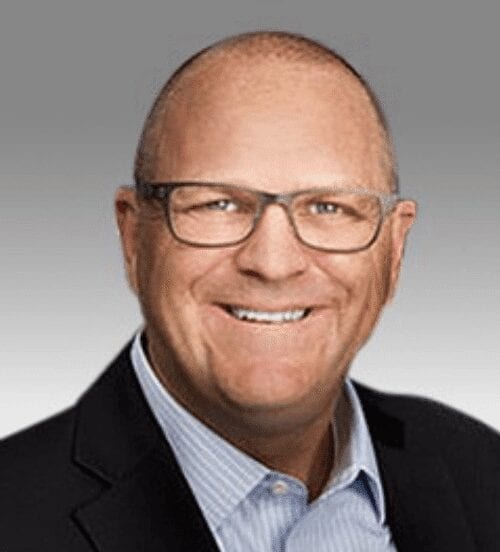
Brown went out to talk about the importance of people in this industry, sharing a story about a 40-year employee for a company whose job was being outsourced who was so passionate about her work she was willing to move from the Midwest to India to save her position. He advised her to become part of the career transition team and she later became a manager, working another five years for the company until her retirement.
“You people – past, present and future – will reshape the outsourcing industry,” Brown said to his colleagues and peers gathered for the awards luncheon. “That’s why I love it and why I am so honored to be part of the Hall of Fame. It’s all in this room.”
Collaborate
The focus of day #3 was on collaborative problem-solving and the various sessions and events during OWS19 reinforced the importance of creating an ecosystem of trusted partners in shared service relationships.
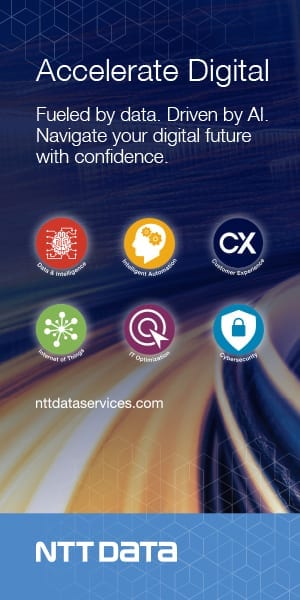 Award-winning collaborative partnerships by customer organizations were recognized with the Global Excellence in Outsourcing (GEO) honor. This year’s recipients were: the Georgia Enterprise Technology Services Team and Warner Media’s Global IT Workforce Management Team.
Award-winning collaborative partnerships by customer organizations were recognized with the Global Excellence in Outsourcing (GEO) honor. This year’s recipients were: the Georgia Enterprise Technology Services Team and Warner Media’s Global IT Workforce Management Team.
In a popular first-time speed networking session, customers, providers and advisors had the opportunity to meet and learn about each other in fast seven-minute rounds with pre-set matches based on their interests.
Delegates also enjoyed networking from start to finish – on the fairways at the PULSE Publisher’s Cup Golf tournament to cocktail receptions in the Global Services Mall and gathering at the Chapter Headquarters where members of IAOP’s various geographic and topical chapters met one another.
Inspire
The Summit’s special focus on impact sourcing and women empowerment, leadership and diversity were inspiring for attendees.
Delegates learned more about how impact sourcing is diversifying the BPO industry during a panel moderated by Jon Browning, CEO, Strategic Sourcing Advisors. Impact sourcing can – and is happening – every place around the world from the practice of hiring disabled veterans in the U.S. to helping workers with autism get past barriers to employment and providing opportunities for youth and women in Africa.
During the awards luncheon, IAOP and The Rockefeller Foundation honored leaders with its second annual Global Impact Sourcing Award (GISA). Selected by a panel of judges from a competitive pool, winners were: Intuit, Samasource, Rural Shores and Harambee. (See PULSE profiles on award winners).
VIP guest Mamadou Biteye, Managing Director of The Rockefeller Foundation, attended the Summit from Nigeria and presented the awards with Browning.
Browning also was recognized as “IAOP member of the Year” along with Chitra Rajeshwari, Executive Director of the Avasant Foundation, who has been a vocal advocate for the WELD chapter. Both served on the judging panel for GISA.
At next year’s Summit, HCL’s Red Ladder Women in Outsourcing Award, in partnership with IAOP, will be presented to high performing and high potential women leaders who are role models for other aspiring women. Nominations for the award will open in March.
Reflecting the continued transformation in the industry, IAOP announced the date of its next Summit – OWS 2.0 – that will be held Feb. 17-19, 2020 at the Renaissance Orlando in Orlando, Florida. For more information, visit www.iaop.org.


